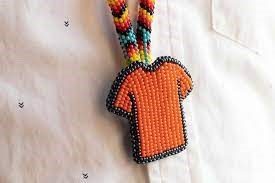HEART LAKE - Recognizing the trials and tribulations Indigenous People in Canada have endured over the almost two-century-long residential school system will be observed on Sept. 30. The national day for Truth and Reconciliation, known as Orange Shirt Day, aims to spread the message while indigenous communities work towards healing.
For some, the Orange Shirt Day awareness campaign is about not only acknowledging the history of the residential school system, but tackling the inter-generational trauma Indigenous people live with, as a result, according to Rayann Blood, Heart lake First Nation’s recreational director.
Blood’s mother was a residential school survivor. The impacts her mother faced after being forced to abandon her culture and languages, alongside physical and emotional abuse at the hands of the school system, deeply impacted Rayann’s childhood.
“The experience that my mother had was a negative one. She wasn’t allowed to speak her first languages which were Cree and Chipewyan, when she did, she would get physically punished for that,” a theme central to many who attended residential school.
As result, growing up her mother never shared that part of their culture with Blood and her siblings.
“For us, we lost our Cree language as a result of what my mother went through in residential school.”
But, the loss of language and her identity was only one impact the system had on her family. Blood’s mother interpreted learned behaviours and parented with an iron fist, which became normalized, she explained.
“That’s how she parented. Really strict and authoritative, and that’s carried on to us.”
Unlearning the behaviour
Over the years, Blood has become a mother herself and has been working to break the cycle that has lived through her family, she said.
“I’m living proof of that inter-generational trauma and I’m the first person in my family that’s breaking that cycle,” she says, which wasn’t easy. “Even though I’m breaking that cycle, I did parent the way mom parented me for the first couple of years, until I started to learn,” she says. Her mother also began the process of breaking the cycle, later in life.
Today, Blood is working with her home community of Heart Lake First Nation, creating programs and working with children and youth for the past 20 years, trying to make a difference.
On her own journey of reclaiming her identity, Blood is learning her native language for the first time, while continuing to work towards educating people about colonization in Canada and substance abuse caused by the trauma.
“I’m taking a Cree class right now at Blue Quills, so that’s part of me reclaiming my culture. A lot of people don’t know the history of our people and that Canada is basically built on genocide. Getting that information out there is important.”
As the Heart Lake community prepares to host an event on Sept. 28 for Orange Shirt Day in partnership with the community’s health centre, Blood hopes to spread the message as a year-round objective for reconciliation.
“I don’t only wear an orange shirt just on Orange Shirt Day. I wear it as often as I can. I’m out there raising awareness and creating conversations... To some people, it may just be an orange shirt, but it represents so much more than just her story,” referring to the founder of the camapaign and survivor Phyllis Webstad
Heart Lake First Nation is located 70 km northeast of the hamlet of Lac La Biche. An event will be held at Heart Lake School at 10 a.m. on Sept. 28.



